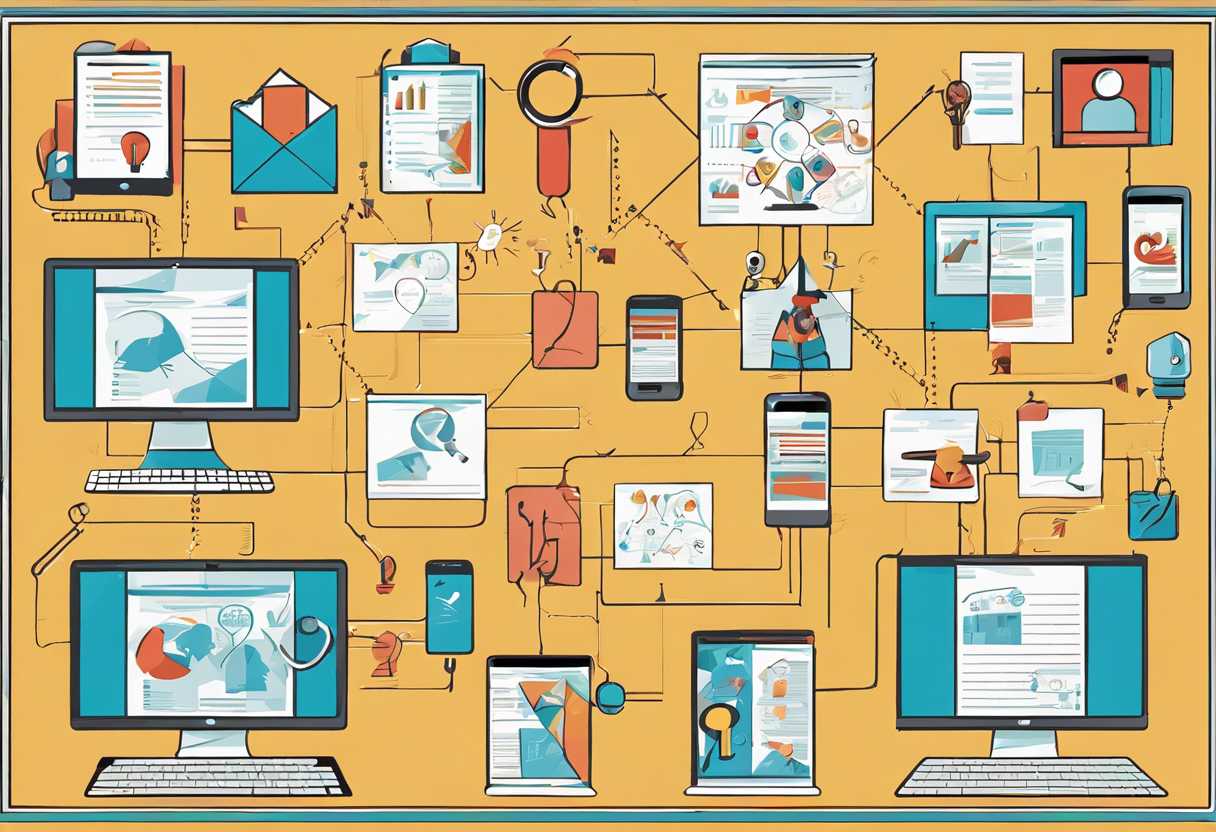Are you curious about how project management works at Google? In this blog post, we will delve into the key components of Google’s project management framework, the role of agile methodology in their approach, the collaboration and communication tools they use, the importance of data-driven decision making, and best practices for successful project execution at Google. Understanding how Google manages its projects can provide valuable insights for businesses looking to improve their own project management strategies. Let’s explore the inner workings of project management at one of the world’s leading tech companies.
The Role of Agile Methodology in Google’s Project Management Approach
Agile Methodology: A Brief Overview
Agile methodology is a project management approach that emphasizes flexibility, collaboration, and customer feedback. It is based on the idea of breaking down projects into smaller, manageable tasks, and continuously adapting to changes throughout the development process. Google has been known to adopt agile methodology in its project management approach, and it has proven to be highly effective in the fast-paced and ever-changing tech industry.
Benefits of Agile Methodology in Google’s Project Management
One of the key benefits of agile methodology in Google’s project management approach is the ability to quickly respond to changes in the market and customer needs. By breaking down projects into smaller iterations, Google can deliver value to its users more frequently and adapt to feedback in real-time. This approach also fosters a culture of collaboration and transparency, as teams work closely together and have a clear understanding of project goals and priorities.
Additionally, agile methodology allows Google to prioritize features and functionalities based on customer feedback and market demand, leading to a more customer-centric approach to product development. This ultimately results in higher customer satisfaction and a competitive edge in the market.
Implementing Agile Methodology at Google
Google follows a structured approach to implementing agile methodology in its project management. This includes establishing cross-functional teams, conducting regular sprint planning and review meetings, and using tools such as Jira and Trello to track progress and manage tasks. The company also emphasizes the importance of continuous improvement, encouraging teams to reflect on their processes and make adjustments as needed.
Furthermore, Google places a strong emphasis on communication and collaboration within agile teams, ensuring that everyone is aligned on project goals and working towards a common vision. This approach has been instrumental in Google’s ability to deliver innovative products and services at a rapid pace, while maintaining high quality and customer satisfaction.

Key Components of Google’s Project Management Framework
Agile Methodology
Google’s project management framework is built on the principles of Agile methodology, which emphasizes flexibility, collaboration, and iterative development. This approach allows teams to adapt to changing requirements and deliver value to customers more efficiently. By breaking down projects into smaller, manageable tasks, teams can quickly respond to feedback and make necessary adjustments, ultimately leading to higher quality outcomes.
Scrum Framework
Within Google’s project management framework, the Scrum framework is widely utilized to facilitate the Agile methodology. Scrum promotes self-organization, accountability, and continuous improvement through its structured approach to project management. With roles such as Scrum Master, Product Owner, and Development Team, clear responsibilities are established, enabling efficient decision-making and progress tracking. Regular meetings, known as “sprints,” ensure that teams stay focused and aligned towards achieving project goals.
Google’s Project Management Tools
Google offers a suite of project management tools that are seamlessly integrated with its framework, empowering teams to collaborate and manage their projects effectively. From Google Drive for document sharing and storage to Google Sheets for data analysis and reporting, these tools provide a centralized platform for communication and resource management. Additionally, Google’s Project Management Tools offer features such as Gantt charts, task tracking, and real-time collaboration, enhancing productivity and transparency within project teams.

Collaboration and Communication Tools Used in Google’s Project Management
Google Workspace
Google Workspace, formerly known as G Suite, is a collection of cloud computing, productivity, and collaboration tools developed by Google. It includes Gmail, Google Drive, Google Docs, Google Sheets, Google Slides, Google Meet, and more. These tools are widely used for project management within Google due to their seamless integration and real-time collaboration features. With Google Workspace, team members can work on the same document simultaneously, leave comments, and track changes, making it an essential tool for effective communication and collaboration.
Google Chat
Google Chat is a communication software developed by Google for internal communication within organizations. It allows users to message in direct or group conversations, share files, and integrate with other Google Workspace apps. Google Chat is an integral part of project management at Google, as it enables team members to communicate in real-time, share updates, and discuss project-related matters efficiently. Its integration with other Google Workspace tools makes it a convenient platform for seamless collaboration.
Google Calendar
Google Calendar is a time-management and scheduling calendar service developed by Google. It allows users to create and edit events, set reminders, and invite others to events. In the context of project management, Google Calendar plays a crucial role in scheduling meetings, setting deadlines, and coordinating tasks among team members. Its ability to integrate with other Google Workspace apps, such as Gmail and Google Meet, makes it a valuable tool for organizing and managing project-related activities.
The Importance of Data-Driven Decision Making in Google’s Project Management
Enhancing Project Efficiency
One of the key benefits of data-driven decision making in Google’s project management is the ability to enhance project efficiency. By analyzing data related to project timelines, resource allocation, and task completion rates, project managers can identify bottlenecks and inefficiencies, allowing them to make informed decisions to streamline processes and improve overall project performance.
Minimizing Risks and Uncertainties
Another important aspect of data-driven decision making in project management is the ability to minimize risks and uncertainties. By leveraging historical project data and predictive analytics, project managers can identify potential risks and anticipate challenges before they arise. This proactive approach allows for the implementation of mitigation strategies and contingency plans, ultimately reducing the impact of unforeseen events on project outcomes.
Optimizing Resource Allocation
Data-driven decision making also plays a crucial role in optimizing resource allocation within Google’s project management. By analyzing data on resource utilization, skill sets, and availability, project managers can make informed decisions about resource allocation, ensuring that the right people are assigned to the right tasks at the right time. This not only maximizes the efficiency of project teams but also minimizes resource wastage and unnecessary costs.
Best Practices for Successful Project Execution at Google
Clear Communication and Collaboration
One of the key factors in successful project execution at Google is clear communication and collaboration among team members. This involves setting clear goals and expectations, establishing regular check-ins, and utilizing tools such as Google Workspace for seamless collaboration. By fostering an environment of open communication, teams can ensure that everyone is on the same page and working towards the same objectives.
Agile Project Management
Google emphasizes the use of agile project management methodologies to ensure successful project execution. This approach allows for flexibility and adaptability, enabling teams to respond to changes and challenges quickly. By breaking down projects into smaller, manageable tasks and iterating on them in short cycles, teams can maintain momentum and deliver high-quality results.
Data-Driven Decision Making
Another best practice at Google is the use of data-driven decision making throughout the project lifecycle. By leveraging data and analytics, teams can gain valuable insights into project performance, identify areas for improvement, and make informed decisions. This approach helps to minimize risks and maximize the chances of project success.
Conclusion
As we have explored in this blog post, project management at Google is a well-oiled machine that relies on the agile methodology, a robust framework, effective collaboration and communication tools, data-driven decision making, and best practices for successful project execution. By incorporating these key components, Google has been able to streamline its project management processes and achieve remarkable success in delivering innovative products and services to its users.
It is evident that Google’s project management approach is centered around adaptability, transparency, and efficiency, which are essential for navigating the dynamic and fast-paced tech industry. By embracing these principles, Google has been able to stay ahead of the curve and maintain its position as a global leader in technology and innovation.
As you consider implementing project management strategies within your own organization, it is crucial to draw inspiration from Google’s best practices and tailor them to suit your specific needs. By leveraging agile methodologies, establishing a solid project management framework, utilizing effective collaboration and communication tools, making data-driven decisions, and adhering to best practices, you can enhance the success of your projects and drive meaningful results.
Ultimately, project management at Google serves as a testament to the power of strategic planning, seamless execution, and continuous improvement. By embracing these principles, you can elevate your project management capabilities and propel your organization towards greater success in the digital age.
Are you ready to revolutionize your project management approach and unlock new levels of success? Take the first step by integrating the key components discussed in this blog post into your project management strategy, and watch as your projects thrive in the ever-evolving landscape of technology and innovation.

